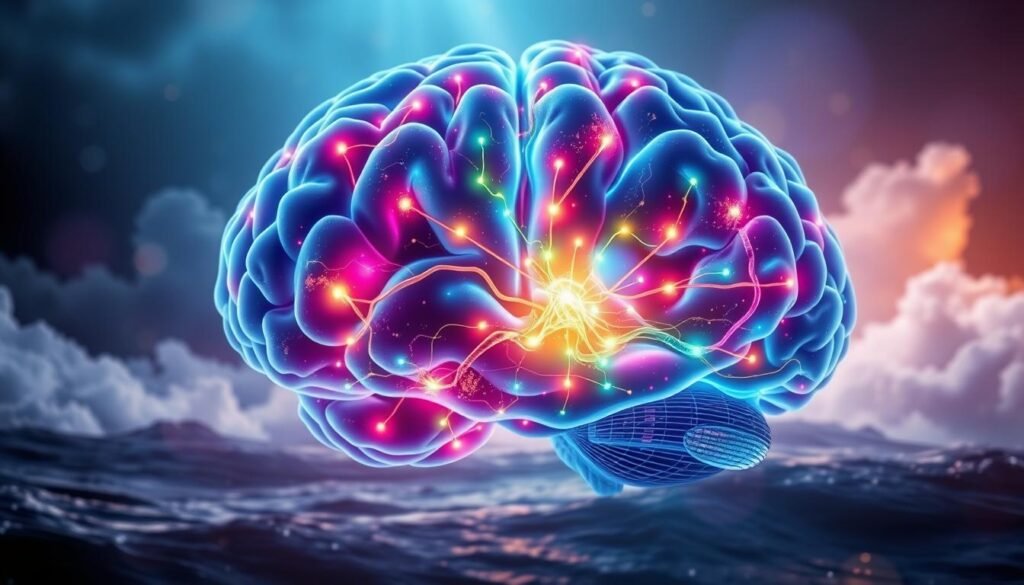About 40 million adults in the U.S. face anxiety disorders every year. This makes it the top mental health issue in the country. Knowing how antidepressants help with anxiety is key for those looking for peace. This piece gives a detailed look at different anxiety meds.
We’ll cover the top antidepressants for easing anxiety and how well they work to control symptoms. By understanding the types of antidepressants, how they work, and natural options, you’ll gain useful knowledge. This can improve your mental health.
Key Takeaways
- Anxiety disorders affect millions in the U.S. annually, highlighting the need for effective treatment options.
- Antidepressants, including SSRIs and SNRIs, play a significant role in managing anxiety symptoms.
- Up to 70-80% of individuals may experience symptom reductions with appropriate treatment.
- The importance of consulting a healthcare provider before starting any anxiety medication cannot be overstated.
- Side effects are common with antidepressants but can often be managed or diminish over time.
- Understanding the connection between anxiety and depression can lead to more effective treatment strategies.
- Natural remedies and psychotherapy serve as valuable components in addressing anxiety alongside medications.
Understanding Anxiety and Depression
It’s important to know how anxiety and depression are linked. Many people deal with both. So, it’s key to treat them together for the best results.
Defining Anxiety Disorders
Anxiety disorders include several conditions. These involve excessive worry, panic attacks, and avoiding certain situations. Generalized anxiety disorder (GAD) affects about 6.8 million U.S. adults each year. For a GAD diagnosis, a person must feel anxious more often than not over six months. The anxiety focuses on different concerns, making it tough to control worries. This can seriously disrupt everyday life, showing why depression and anxiety treatment is critical.
- Restlessness
- Irritability
- Difficulty concentrating
- Trouble sleeping
- Fatigue
- Muscle tension
Anxiety disorders are the number one mental health issue in the U.S., with over 19% affected. They’re especially increasing among young people. This makes finding good coping methods and therapies like cognitive-behavioral therapy (CBT) and mindfulness-based cognitive therapy (MBCT) really important.
Recognizing Symptoms of Depression
Depression can show up as lasting sadness, emotional pain, and loss of pleasure. Changes in sleep, appetite, and energy are common signs. Acknowledging these symptoms early is key for treatment. Often, depression and anxiety happen at the same time. This makes a well-rounded depression and anxiety treatment approach essential.
The Link Between Anxiety and Depression
It’s important to know how anxiety and depression are linked. These issues often come together. This makes it hard for people to get better. This mix is a big hurdle for those wanting to feel emotionally well.
Co-occurring Conditions
Many people have both anxiety and depression. Research shows that people with anxiety often have depression too. This fact makes treating anxiety more complex since both issues need attention.
How They Affect Daily Life
Anxiety and depression can greatly affect your day-to-day life. You might feel very sad, worry a lot, feel tired, and have trouble focusing. Tasks every day become harder. It becomes tough to keep up with friends.
Dealing with these feelings might mean treating both anxiety and depression together. Treatments like talking to a therapist and medications can help a lot. Changes in your life also play a big role in feeling better.
Therapy and antidepressant medicines can really improve how you feel. Sometimes, feeling very down can start anxiety issues. To prevent this, try to sleep well, support each other, and stay active. Remember, drinking and smoking can make everything worse.

Looking into how anxiety and depression affect each other further is wise. Learning about treatments is key to handling these issues well. A plan just for you is best for dealing with them together.
Types of Antidepressants for Anxiety Relief
There are many types of antidepressants, each designed to tackle anxiety in different ways. For those seeking relief, understanding these options is key. The main types include SSRIs, SNRIs, atypical antidepressants, and TCAs.
Selective Serotonin Reuptake Inhibitors (SSRIs)
SSRIs are often the first choice for anxiety. They boost serotonin in the brain, helping to improve your mood. Drugs like Zoloft (sertraline) and Lexapro (escitalopram) are popular because they have fewer side effects. It usually takes four to six weeks to see their full effect.
Serotonin-Norepinephrine Reuptake Inhibitors (SNRIs)
SNRIs work on both anxiety and depression. They do this by affecting serotonin and norepinephrine. Drugs like Duloxetine (Cymbalta) and Venlafaxine (Effexor XR) are good examples. While they can help with chronic pain, they might cause nausea, dizziness, and headaches. They need careful monitoring, especially in young people, due to the risk of suicidal thoughts.
Atypical Antidepressants
Atypical antidepressants are for those who don’t find SSRIs or SNRIs effective. They work differently and can be a good option for certain individuals. This group offers a different approach to treatment, which can be beneficial.
Tricyclic Antidepressants (TCAs)
TCAs are less commonly used today because of their side effects. However, they’re still a choice for treating anxiety and depression in some cases. Drugs like amitriptyline may work for patients who haven’t had success with other medications.

| Antidepressant Type | Examples | Common Uses | Typical Side Effects |
|---|---|---|---|
| SSRIs | Zoloft, Lexapro | Anxiety disorders, depression | Dry mouth, insomnia, nausea |
| SNRIs | Duloxetine, Venlafaxine | Anxiety, depression, chronic pain | Dizziness, headaches, excessive sweating |
| Atypical Antidepressants | Wellbutrin, Remeron | Depression, anxiety | Varied; less common than SSRIs/SNRIs |
| TCAs | Amitriptyline, Clomipramine | Anxiety, depression | Weight gain, constipation, drowsiness |
How Antidepressants Work
Grasping how antidepressant mechanism works is key to understanding their benefit in treating mood and anxiety disorders. These drugs adjust brain neurotransmitter levels, which are vital for mood control. Studies show they greatly aid individuals dealing with anxiety.
Mechanism of Action
Antidepressants help balance brain chemicals through different methods. For instance, SSRIs boost serotonin by preventing its absorption back into neurons, uplifting mood. SNRIs, on the other hand, raise both serotonin and norepinephrine levels. This helps enhance mood and lower anxiety symptoms, making us understand medication’s role in mood management better.
Neurotransmitters Involved in Mood Regulation
Antidepressants mainly affect serotonin, norepinephrine, and dopamine, crucial for mood and emotions. Serotonin, the “feel-good” chemical, impacts happiness and well-being. Norepinephrine deals with stress, while dopamine is about pleasure and rewards. This balance of chemicals is why antidepressants are effective for depression and anxiety. For more details on these treatments, visit this resource on antidepressant treatments.

Choosing the Right Antidepressant for Anxiety
Picking the best antidepressant is key to handling anxiety well. Things like individual symptoms and health history matter a lot. By knowing these factors for antidepressant selection, you get a treatment that really fits you, making it work better.
Factors to Consider
We think about several key things when choosing antidepressants:
- Past Responses: Looking at what worked or didn’t before helps figure out good medication choices.
- Co-occurring Conditions: Other health problems play a role in which medication to choose and its success.
- Side Effects: Knowing about different side effects helps pick the right drug.
- Medication Interactions: Checking how new meds might mix with current ones is crucial.
- Lifestyle Factors: How you live, including your diet and exercise, affects how well the medication works.
Consulting Your Healthcare Provider
Talking to a healthcare provider is an important part of choosing antidepressants. They offer advice based on your health needs. Together, you and your provider can find the best med. They keep an eye on side effects, which is especially important for kids and teens. By having regular check-ups, your treatment can change as needed, staying effective over time.
Best Antidepressants for Anxiety
Choosing the right antidepressants is key in managing anxiety. The meds listed below are preferred by doctors for their good results and safety. They are known to work well for most people.
Zoloft (Sertraline)
Zoloft is a top option for treating anxiety. It’s an SSRI that boosts serotonin to help ease anxiety. This medicine is typically prescribed in doses from 50-200mg and is known for having mild side effects.
Lexapro (Escitalopram)
Lexapro is another highly recommended antidepressant. As an SSRI, it offers benefits similar to Zoloft. It’s effective against both anxiety and depression with few drug interactions. This makes Lexapro a go-to for those looking for relief.
Effexor (Venlafaxine)
Effexor works differently as an SNRI. It increases both serotonin and norepinephrine, targeting anxiety more broadly. Many find Effexor’s dual action helpful in their treatment plans.
Cymbalta (Duloxetine)
Cymbalta, also an SNRI, has the perks of easing chronic pain too. This makes it a great choice for folks dealing with anxiety and pain. Its ability to address both issues is why many favor Cymbalta for anxiety care.
Using these meds often means working closely with your doctor. Regular check-ups help track progress and adjust doses to get the best results for anxiety sufferers.
| Antidepressant | Type | Effective Dose Range (mg) | Special Benefits |
|---|---|---|---|
| Zoloft | SSRI | 50-200 | Mild side effects |
| Lexapro | SSRI | 10-20 | Limited drug interactions |
| Effexor | SNRI | 75-225 | Dual mechanism for resistant anxiety |
| Cymbalta | SNRI | 60-120 | Also treats chronic pain |
Antidepressants and Side Effects
Knowing about antidepressant side effects is key for anyone thinking of starting or currently on these drugs. Antidepressants work well for deep or long-term depression. But, they can cause issues, notably for mild depression cases. With SSRIs, some people might feel nauseous, gain weight, get tired, or have trouble sleeping. About 30% of patients report these within a few weeks. Sexual dysfunction is another common side, affecting 40-70% of users.
Common Side Effects of SSRIs and SNRIs
When you start on SSRIs or SNRIs, you might face several side effects, including:
- Upset stomach
- Diarrhea
- Drowsiness or fatigue
- Insomnia
- Dry mouth
- Agitation and restlessness
Most of these effects get better over time. But, some can cause bigger problems. For example, there’s a slight higher chance of stomach bleeding with SSRIs, especially if you also take NSAIDs. Also, they might increase suicidal thoughts, mostly in people younger than 25.
Managing Side Effects
Handling side effects well means talking often with your doctor. You might need to change the dose or the medicine to feel better while being treated. If you stop antidepressants suddenly after six weeks, about 20% of people have withdrawal symptoms. Tapering off slowly, over four weeks or more, is safer.
To learn more about handling side effects and the risks of different medicines, it’s best to look at in-depth sources like Mood Care Health.
Natural Remedies and Coping Strategies
Anxiety can be tackled in several natural ways. Methods beyond standard drugs let people support their mental health fully. Studies show that techniques like cognitive-behavioral therapy and mindfulness have big psychotherapy benefits. They help reduce anxiety symptoms well.
Alternatives to Medication
Using natural remedies for anxiety daily can boost your well-being. Here are some top strategies:
- Regular Exercise: Activity cuts anxiety by 20-30%.
- Dietary Modifications: Less caffeine and alcohol can improve your mental state. Too much of either can worsen anxiety and panic attacks.
- Aromatherapy: Essential oils have helped lower anxiety by up to 30% for some people.
- Herbal Remedies: Chamomile might cut symptoms of anxiety in half, research shows.
Psychotherapy and Counseling
Getting professional support brings huge psychotherapy benefits for those dealing with anxiety. Some therapeutic methods include:
- Cognitive-Behavioral Therapy (CBT): This technique teaches coping skills for negative thoughts.
- Mindfulness-Based Stress Reduction (MBSR): A 8-week course rivals antidepressants in easing anxiety.
- Exposure Therapy: This method helps people face fears slowly, lessening their anxiety over time.
These methods show that dealing with anxiety involves many strategies. They ensure people don’t just cope, but thrive in their lives.
Conclusion
Managing anxiety is tough, but antidepressants help a lot. They ease symptoms and improve mental health. People can choose the best type for them, like SSRIs or SNRIs. Studies show that drugs like venlafaxine and paroxetine work better than fake pills for anxiety.
About half of the patients feel better in 6 to 8 weeks with an SSRI. Combining medicines with therapy works best. It’s key to watch out for side effects and talk with doctors to tweak the plan if needed.
Adding natural remedies and exercise to antidepressants helps with anxiety. Making informed choices and taking part in your treatment leads to real mental health improvements. It’s not just hope, but a reality we can reach.